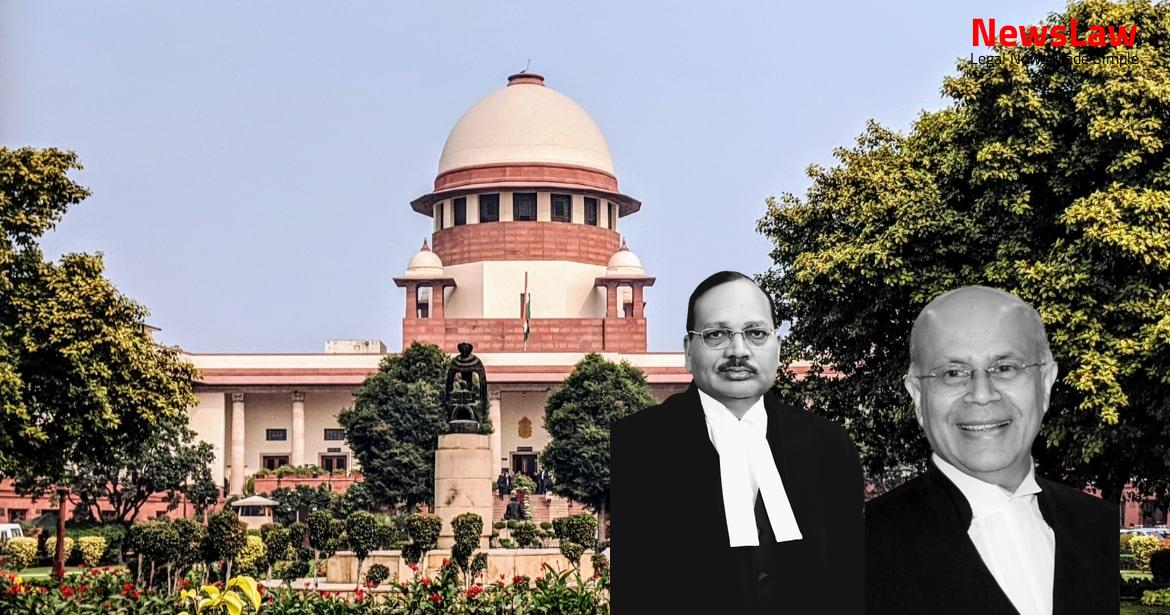In exercise of concurrent power under Entry 42 in List III of the Seventh Schedule to the Constitution of India, it enacted ‘The Tamil Nadu Acquisition of Land for Harijan Welfare Schemes Act, 1978’; ‘The Tamil Nadu Acquisition of Land for Industrial Purposes Act, 1997’; and ‘The Tamil Nadu Highways Act, 2001’. Thereby, Section 105-A was inserted in the new LA Act, making the provisions thereof inapplicable or applicable with modifications to the Acts relating to land acquisition in the State of Tamil Nadu, which were specified in the newly added Fifth Schedule. In consequence, the Right to Fair Compensation and Transparency in Land Acquisition, Rehabilitation and Resettlement (Tamil Nadu Amendment) Act, 2014 (Act No.1 of 2015), came into force with retrospective effect from 01.01.2014.
Thirunarayanan, the second petitioner in W.P.No.26028 of 2013, also filed W.P.No.10282 of 2015 seeking a declaration that Act No.1 of 2015 was ultra vires the Constitution and a consequential direction to the authorities not to acquire his lands in Kancheepuram District. 4) Are the provisions of Section 105-A(2) and (3) mandatory, and if so, whether non-compliance with these provisions (is, sic ) fatal to the validity of these enactments.’ As regards the first issue, the High Court noted that the validity of the Tamil Nadu Acquisition of Land for Harijan Welfare Schemes Act, 1978, was upheld by the Supreme Court in State of Tamil Nadu and others Vs. Similarly, the Tamil Nadu Highways Act, 2001 (for brevity, ‘the Highways Act’), was upheld by the Madras High Court in S.N. The High Court opined that Article 254(2) of the Constitution required the repugnant law to be reserved for consideration afresh by the President for giving his assent thereto and, therefore, these State Acts had to receive Presidential assent in the present sense. The High Court held that as Section 105-A, inserted in the new LA Act by Act No.1 of 2015, was rendered virtually otiose as Act No.1 of 2015 did not meet the requirements of Article 254(2) of the Constitution and did not have the effect of reviving the State Acts, the validity of Section 105-A need not be independently examined. 5692-5695 of 2021, arose out of the common order dated 03.07.2019 in so far as it pertained to W.P.Nos.26234 & 26028 of 2013 and W.P.Nos.10282 & 10283 of 2015 respectively. This writ petition was also clubbed with the batch of writ petitions, which came to be disposed of by the common order dated 03.07.2019. In his application for permission to file the SLP, he stated that W.P.No.21323 of 2015 raised a challenge to the Highways Act, which was missing in his own writ petition and he, therefore, wanted to raise that issue before this Court.
He was granted leave to do so on 09.09.2021 and his SLP 7 was numbered as Civil Appeal
Also Read: https://newslaw.in/case-type/civil/c-a-no-003615-003615-2023/
No 5697 of 2021.
5692-5693 of 2021 : The Industrial Purposes Act is founded on the premise that the State of Tamil Nadu found it expedient to make special provision for speedy acquisition of lands for industrial purposes in the State of Tamil Nadu and for matters connected therewith.
The scheme therein envisages that the Government would cause a Public Notice to be given under Section 3(2) of the Industrial Purposes Act, in such manner as may be prescribed, calling upon the owner of the land and any other person, who in the opinion of the Government may be interested in such land, to show-cause, within such time as may be specified in the Public Notice, why the land should not be acquired. 236, Pillaipakkam Village, Kancheepuram District, under registered sale deed dated 14.12.2012, long after initiation of the acquisition proceedings, by issuance of the Public Notice on 23.10.2007, for setting up SIPCOT Industrial Park. In the above milieu, the question that would arise is as to the locus standi of the appellants, who admittedly purchased their lands after the initiation of land acquisition proceedings, to maintain a challenge to the provisions of the Industrial Purposes Act and the proceedings initiated thereunder. Per contra, the appellants assert that they would have locus to challenge the validity of the Industrial Purposes Act, as their sale transactions were nearly 6 years after issuance of the Public Notice under Section 3(2) of the 10 Industrial Purposes Act and any reasonable person would have a bonafide belief that such proceedings would have lapsed owing to passage of time. 1063 of 2012, decided on 17.10.2022], which held that in cases where compensation still needed to be determined for acquisitions made under the Industrial Purposes Act, the new LA Act would apply perforce and the base date for determining compensation would not be the date on which the Section 3(2) Notice was issued but 01.01.2014, the date on which the new LA Act came into force. The Bench held that a sale transaction, effected after the Notification under Section 4 of the old LA Act, is void and would be ineffective to transfer the land and such a sale would not clothe the subsequent purchasers with title, whereby they could claim to be in possession.
Be it noted that, in UP Jal Nigam, Lucknow (supra), Meera Sahni (supra) and V. Gopalakrishnan and V. Thirunarayanan seek to assail the validity of the Industrial Purposes Act only in the context of the acquisition proceedings initiated thereunder in relation to the lands purchased by them after issuance of the Public Notice under Section 3(2) thereof, viz., the equivalent of a Notification under Section 4 of the old LA Act, their challenge is tainted and unacceptable in its very inception.
Also Read: https://newslaw.in/case-type/civil/restriction-on-project-wise-insolvency-resolution-process/
Chinnappan assail the common order dated 03.07.2019 passed by the Madras High Court, whereby challenge to the validity of the Highways Act, on the grounds of arbitrariness and violation of Article 14 of the Constitution, was rejected. Thereafter, Public Notice dated 02.07.2016, under Section 15(2) of the Highways Act, which is the equivalent of Section 3(2) of the Industrial Purposes Act, was issued calling for objections as to why their lands should not be acquired for the said purpose. Section 10(2) states that all rules, notifications, notices, orders, directions issued or any other proceedings initiated under the Highways Act, except those relating to determination of compensation, which were in force immediately before 26.09.2013 shall, for all purposes, be deemed to have been revived on and from 26.09.2013. Act shall cease to apply to any land which is required for the purposes specified in Section 15(1) of the Highways Act and any such land shall be acquired by the Government only in accordance with the provisions of the Highways Act. It is pointed out that a Social Impact Assessment Study Report would lapse, under Section 14 of the new LA Act, if the Preliminary Notification under Section 11 is not issued within 12 months from the date that such report is submitted, and in such an event, a fresh Social Impact Assessment Study has to be undertaken before acquisition proceedings are initiated. In the context thereof, it is pointed out that Section 19(7) of the new LA Act prescribes the time limit of one year between the Notification under Section 11 and the publication of the Declaration under Section 19 and in the event of failure to abide by this time stipulation, the Preliminary Notification is deemed to lapse, subject to exceptions in terms of the second proviso to Section 19(7) of the new LA Act. It is further pointed out that the procedure prescribed in Section 28 of the new LA Act for determining the amount of compensation is not followed by the State of Tamil Nadu under the Highways Act and more particularly, the power given to the Collector under Section 28(7) of the new LA Act to take into consideration any other ground which may be in the interest of equity, justice and beneficial to the affected families.
It is contended that though the Validation Act of 2019 applies the provisions of the new LA Act to the Highways Act insofar as compensation is 17 concerned, the selective application of the provisions of the new LA Act would result in discrimination even in the matter of compensation. An example is cited, where a person’s land may be acquired under the Highways Act while his neighbour’s land, which is identically situated in all respects, is acquired under the new LA Act, but they would be given compensation on different criteria owing to the absence of timelines in the 18 Highways Act, which would permit the State to peg the market value on a past date to determine the compensation unlike the situation obtaining under the new LA Act. It is also argued that certain critical clauses pertaining to compensation, contained in Sections 27 to 30 of the new LA Act, are not brought into play in the Highways Act, as only the First Schedule to the new LA Act has been incorporated therein, causing discrimination, as land owners whose lands have been acquired under the Highways Act would not be entitled to the benefits under these provisions of the new LA Act.
It is contended that the question of comparing the Highways Act with the new LA Act would not arise at all, as any repugnant provision in the Highways Act would continue to operate notwithstanding the contrary provision in the new LA Act, as the Validation Act of 2019, which revived the Highways Act, stood protected by the assent given by the President of India under Article 254(2). The very foundation and basis of Article 254(2) of the Constitution is that a particular State enactment runs contra to the provisions of a Central legislation on the same subject, but despite the same it would stand protected after it receives the assent of the President of India thereunder. In such a situation, the question of comparing the two legislations, for the purpose of making out a case under Article 20 14 of the Constitution, would not arise. It was in those circumstances that the Bench observed upon a 21 comparative study of the old LA Act and the Amending Act that, if a land is acquired for a housing scheme under the Amending Act, the claimant would get a lesser value than what he would get for the same land if it was acquired for a different public purpose under the old LA Act and such classification between persons whose lands were acquired for housing schemes and those whose lands were acquired for other public purposes would not be a reasonable one under Article 14.
In Ranganatha Reddy (supra), a Constitution Bench of 7 Judges observed that the repugnancy, if any, between a State Act and a Central Legislation on a subject in the Concurrent List would stand cured if the State Act receives the assent of the President under Article 254(2) and such repugnancy cannot thereafter be a ground to invalidate the State Act.
However, the old LA Act was amended by the Land Acquisition (Amendment) Act, 1984, whereby several new provisions were inserted in the interest of the land owners, by enhancing the amount of solatium and interest. Owing to this construction and interpretation of the statutory provision, this Court held that it would not be necessary to deal with the submission that, if the provisions of the Amendment Act of 1984 were not applicable to acquisitions under the State Act of 1965, the provisions of the old LA Act made applicable under the State Act of 1965 would be void on the ground of repugnancy 23 under Article 254 of the Constitution. Noting that it provided for acquisition of land in terms of the old LA Act and by reason of the legal fiction created thereunder, this Court held that, even if the acquisition was made under the State Act of 1965, if higher amount of compensation is payable under the old LA Act, such higher amount of compensation has to be paid. Mohan Rao (supra) and this Court observed that the whole exercise of pointing out any repugnancy after a validating Act has obtained the 24 assent of the President is otiose for the whole purpose of Article 254(2) of the Constitution is to resuscitate and operationalize a repugnant Act or repugnant provisions of such Act.
Peter (supra), while dealing with the attack against absence of a time limit for Government sanction in the Town Planning Act, 1932, this Court observed that, as the scheme of the said enactment was urgent improvement of a town and it was left to the Government to deal with it with expeditious dispatch, no precise time scale could be fixed in the Act owing to the myriad factors which would have to be considered by the Government before granting sanction to a scheme and concluded by stating that the Court would not be powerless to quash and grant relief where, arbitrary protraction or malafide inaction of the authorities caused injury to an owner. No doubt, the scheme of the new LA Act advocates timely measures being adopted in implementation of the acquisition and such general temporal restrictions would benefit the land owners, but the absence of such restrictions in the Highways Act may not be reason enough to invalidate it, as the very premise on 25 which the Highways Acts was enacted by the State of Tamil Nadu was to cut down on time-consuming processes.
Also Read: https://newslaw.in/supreme-court/constitutionality-of-lotteries-regulation-act-1998/
Therefore, the State of Tamil Nadu would be bound to apply only the Highways Act for acquiring lands for the purposes reserved thereunder. Parties shall bear their own costs.
Case Title: C.S. GOPALAKRISHNAN Vs. THE STATE OF TAMIL NADU (2023 INSC 510)
Case Number: C.A. No.-005692-005695 / 2021



